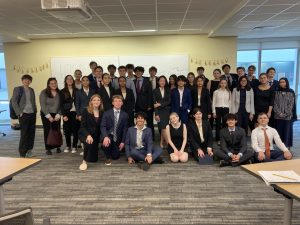Inequity rampant in Illinois public schools
New Trier stands as an outlier as other schools struggle to find minimal funding
December 14, 2016
Although rarely discussed in New Trier’s hallways, the way schools are funded in Illinois dramatically affects the lives of every public school student in the state, regardless of the township they live in.
Under the current system, schools across Illinois are given roughly the same amount of money from the state, while the rest of school funding comes from local property taxes.
This property tax is a regressive flat tax, meaning that there is a uniform tax for everyone, regardless of financial situation.
To put the proportion of funding into perspective, according to Christopher Johnson, New Trier’s Assistant Superintendent for Finance and Operations, “New Trier receives approximately 95 percent from local sources (property taxes, fees, other local revenue), 3 percent from the state, and 2 percent from the federal government.”
With the amount of school funding generated locally, along with the remarkable financial situation of many families in this township, it becomes evident why many public high schools are not as fortunate.
Spiro Bolos, a Social Studies teacher and Social Service board sponsor, volunteers with the Metropolitan Community project, a project comprised of both students and faculty at New Trier that partner with CPS schools to advocate for fair funding of schools in Illinois.
He explained that with a lack of funding, “Schools lack a lot of support services, like having an adviser or a nurse. If they can’t go to the nurse, some kids go home, or don’t come to school at all.”
In addition to its direct impact, stark correlations can be found between school funding and student opportunity.
According to the Illinois Report Card, New Trier prepares 92 percent of its students for college, and has a low-income student population of 4 percent.
Conversely, Fenger High School – a CPS school just 30 minutes south of New Trier – prepares only 4 percent of its students for college and has a low income population of 97 percent.
With lower-valued properties in the Fenger district, property tax revenue cannot adequately fund the schools, and thus resources are heavily impacted.
Given such statistics, many may have the initial reaction to give a portion of New Trier’s funding to schools in need. Bolos explained such a model, where, “In some other states, they collect all of the tax revenue and distribute it according to need instead of zip code.”
However, this may not be the most mutually beneficial solution to such a complex issue.
Johnson explained that “If property tax money was re-distributed, it would reduce the funding available to us, unless there was another source for us to raise additional revenue. If no additional revenue was raised, this would likely lead to a dramatic change to the educational programming we are able to offer our students.”
In terms of other types of funding systems that can be adopted, Johnson said, “I believe a plan that raises revenue for districts that are the most in need, combined with a change in the state funding available to other districts, would be an effective plan to quickly provide funds to districts that need more fiscal support. This type of plan also would allow districts like ours to continue to offer a high quality program for our students.”
Although there is a discussion behind various methods, many students, especially in the school districts negatively impacted by the current system, believe that this is an issue in definite need of reform.
Max Garland, a junior at Taft High School in Chicago, said, “We have no money. We are losing teachers. Nothing gets fixed. Once the lights in our gym were broken and they weren’t fixed for three months. We couldn’t use the gym at all.”
Although school funding reformation is a complex issue, Bolos said students can play a vital role in the initial steps, by ”going down to Springfield and requesting an audience with a legislator. Those are the only people that can do anything. Springfield is the only place that can change things.”
Bolos said that his club has written letters, which has given them an audience with legislators in the past. According to State Senator Daniel Biss, the most powerful thing a person can do to raise awareness in the general assembly is to hand-write a letter and talk about experiences with the issue. Those types of letters get more attention than an email, or even a march.











































